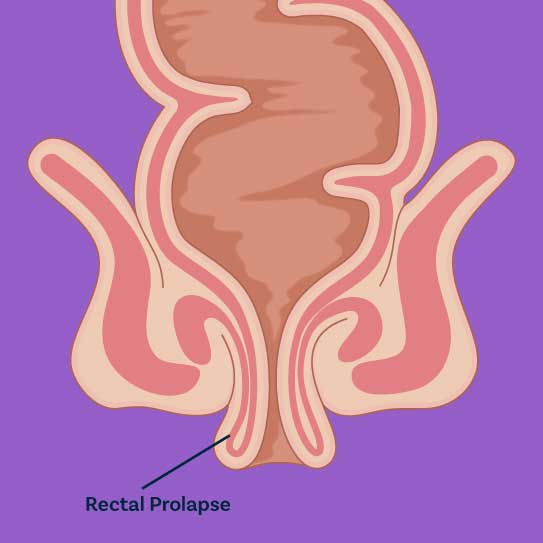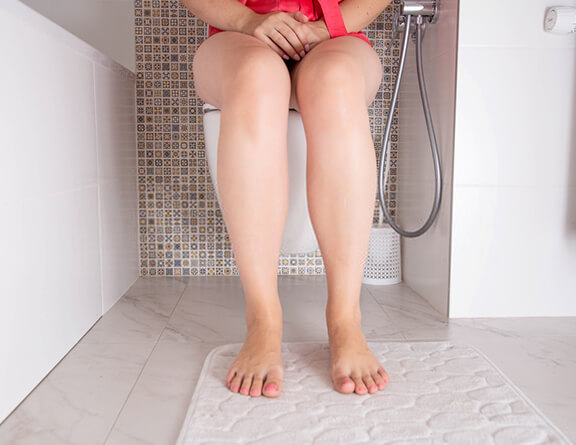
Gandhinagar
USFDA Approved Procedures
Minimally invasive. Minimal pain*.
Insurance Paperwork Support
1 Day Procedure

Failure of the muscles that hold the rectum in place leads to rectal prolapse and several things can contribute to this. Some possibilities include:
Some of the symptoms of rectal prolapse include:

Treatment & Diagnosis For Rectal Prolapse In Gandhinagar
Your healthcare provider will check your medical history, then examine your rectum. To confirm the diagnosis of rectal prolapse or rule out other possible issues, they might use some tests like:
One of the best ways to treat rectal prolapse is through surgery which involves putting the rectum back in its original place. The kind of surgery your doctor suggests will depend on factors like your overall medical condition, age, and how serious your rectal prolapse condition is. The two most common types of rectal prolapse surgeries are:
If your rectal prolapse is caught early, your doctor might treat it by suggesting you take stool softeners to make it easier to go to the bathroom and by pushing the rectum’s tissue back up the anus by hand. But, normally, you will eventually need to undergo surgery to fix rectal prolapse.
Delivering Seamless Surgical Experience in India
Your safety is taken care of by thermal screening, social distancing, sanitized clinics and hospital rooms, sterilized surgical equipment and mandatory PPE kits during surgery.
A dedicated Care Coordinator assists you throughout the surgery journey from insurance paperwork, to free commute from home to hospital & back and admission-discharge process at the hospital.
Our surgeons spend a lot of time with you to diagnose your condition. You are assisted in all pre-surgery medical diagnostics. We offer advanced laser and laparoscopic surgical treatment. Our procedures are USFDA approved.
We offer free follow-up consultations and instructions including dietary tips as well as exercises to every patient to ensure they have a smooth recovery to their daily routines.
Rectal prolapse surgery has a high success rate for prolapse control, approximately 75%, and incontinence is improved in 60% of patients. In addition, recurrence of rectal prolapse after surgery occurs in just about 2% to 5% of people.
There are multiple ways to manage rectal prolapse from worsening. However, surgery is the best approach to treat rectal prolapse. The choice of surgical treatment lies on the specifics of the patient’s condition and the surgeon’s. For healthy adults, the best choice of surgical treatment is usually a rectopexy, a method to repair the rectum through the abdomen. But, some people are not the right candidates for rectopexy. In these cases, rectal surgery remains the next viable treatment option.
Rectal prolapse can look different from person to person. If there is an internal rectal prolapse, the rectum begins to slip partway into the anus. In the case of mucosal prolapse, the inner mucous lining of the rectum spins inside out and begins to peak out of the anus. External prolapse happens when the complete rectum falls out.
Rectal prolapse majorly causes discomfort to people, but can also lead to other possible complications like difficulty in pooping, ulceration, and bleeding.
Spontaneous and unforced rupture of the rectum due to increased intraabdominal pressure is an infrequent complication of rectal prolapse in adults.
Call your healthcare provider if you experience any of these symptoms along with a prolapsed rectum:
Some of the tips to prevent rectal prolapse include the following:
Hemorrhoids and rectal prolapse can have similar symptoms, and it is not uncommon to mistake one for the other. Hemorrhoids — inflamed blood vessels in the anus or rectum — can also provoke itching, pain, or bleeding. Hemorrhoids can even prolapse and they may look similar to mucosal rectal prolapse.
Both rectal prolapse and hemorrhoids can happen during and after pregnancy, or in conjunction with chronic diarrhea or constipation. While rectal prolapse has multiple causes, hemorrhoids are primarily caused by excessive straining. They are also temporary and will go away on their own after a certain time. But, rectal prolapse is chronic and progressive. The symptoms may change, but they won’t go away.
Rectal prolapse surgery comes with certain risks of general complications, like:
Additional risks and complications linked with rectal prolapse surgery include:
.svg)
.svg)